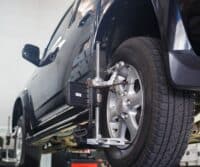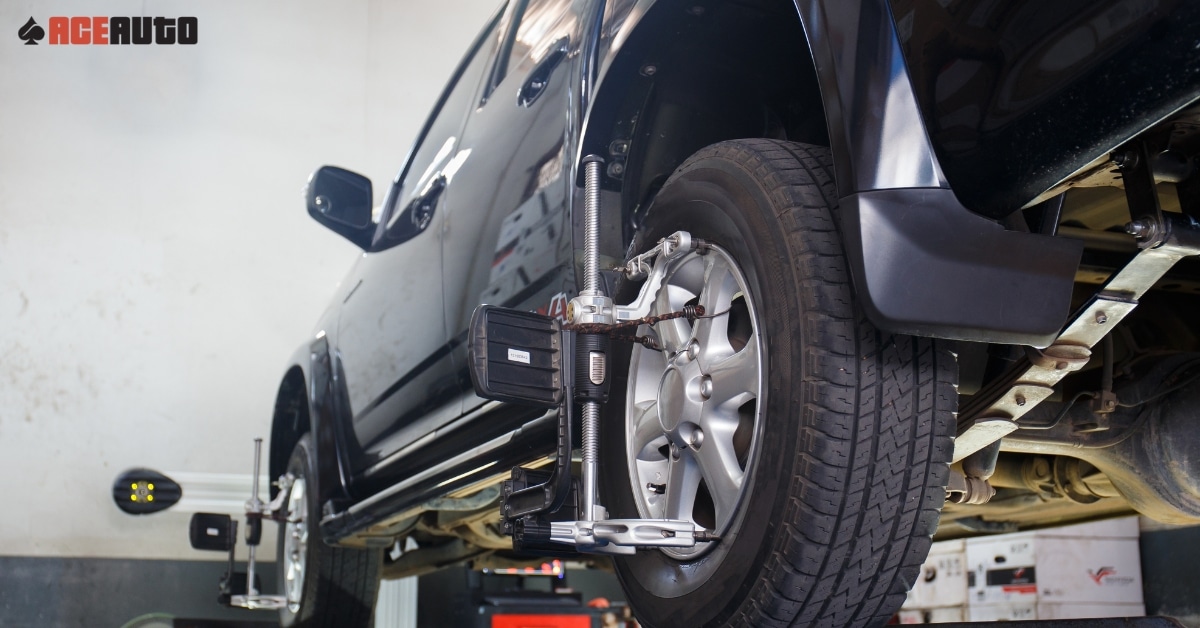Transmission Repair Specialists in West Jordan, Utah
Is your vehicle experiencing transmission troubles? We're transmission repair geniuses! We guarantee we can fix your transmission and get you up and running in no time.
READ MORE -

Nothing beats the thrill of driving a perfectly aligned car on the open road. All components work in harmony, ensuring the smooth handling and longevity of your vehicle. However, experiencing issues like uneven tire wear or veering to one side could be signals that your car needs an all-wheel alignment. These telltale signs are more than mere annoyances, they could lead to bigger problems down the road.
When you let go of the steering wheel on a straight, even road, does your car pull to one side? This is a classic indication of alignment issues. Your car should ideally continue straight for a considerable distance.
Check your tires! If one side of the tire is wearing out faster than the other, it's time to consider an all-wheel alignment.
This could be caused by wheels that are out of balance or alignment. It's essential to address this immediately to prevent further damage.
Do you struggle to steer your car straight or does your steering wheel feel stiff? This could be due to misaligned wheels causing an imbalance in the car's dynamics.
If your steering wheel isn't centered when driving straight, this could be a sign that your vehicle needs alignment.
Cars are complex machines, and it's normal for things to go off-balance over time, especially with the varying road conditions in Utah. This is where we at Ace Auto Repair can help.
When your vehicle feels unstable or loose, it could be due to improper wheel alignment.
A severe jolt, like hitting a pothole or curb, can knock your vehicle out of alignment.
Sometimes, after a tire change or rotation, vehicles may require an alignment check.
Misaligned wheels can lead to increased friction and, consequently, lower fuel efficiency.
If you notice any unusual noises while driving, especially squeaking or scraping, it might be an alignment issue.
At Ace Auto Repair, we're committed to ensuring your vehicle performs at its best. Our expert mechanics can swiftly diagnose any alignment problems and provide efficient solutions, ensuring you safer and smoother rides.
As every car is unique, the all-wheel alignment cost may vary. We offer free auto repair quotes to give you a sense of the all-wheel alignment price without causing any financial surprises.
All-wheel alignment, also known as four-wheel alignment, involves adjusting the angles of all four wheels so they're perpendicular to the ground and parallel to each other. This process optimizes vehicle handling and tire lifespan. Regular alignments prevent uneven tire wear, ensuring that your vehicle handles correctly.
The frequency for wheel alignment can vary based on your vehicle's make and model, your driving habits, and the conditions of the roads you travel on. However, as a general guideline, a vehicle alignment is recommended every 2 to 3 years, or whenever new tires are installed. If you notice uneven tire wear, your car pulling to one side, or your steering wheel vibrating, it might be time for an alignment.
Some signs indicating the need for an alignment include uneven tire wear, your vehicle drifting to one side even when you're trying to drive straight, a steering wheel that vibrates, or a steering wheel that's off center when driving straight.
A proper wheel alignment helps your tires perform properly and helps them last longer. It can also improve handling and keep your vehicle from pulling in one direction or vibrating strangely on the road.
Ignoring the alignment needs of your vehicle could result in uneven tire wear, poor vehicle handling, decreased fuel efficiency, and a potentially unsafe driving condition.
While front-end or two-wheel alignment adjusts only the front wheels, all-wheel alignment, also known as four-wheel alignment, adjusts all four wheels of your vehicle. Four-wheel alignment is recommended for vehicles with four-wheel drive or an adjustable rear suspension.
During an all-wheel alignment, several components of your vehicle's suspension are adjusted. These include the camber (the inward or outward angle of the tire when viewed from the front), the caster (the angle of your steering axis when viewed from the side), and the toe (the extent to which your tires turn inward or outward when viewed from above).
The duration of a wheel alignment service can vary based on the vehicle and the specific service provider, but on average, it should take about an hour to complete.
Yes, hitting a pothole or other road hazard can cause a shift in your vehicle's suspension system, affecting the wheel alignment. Your automotive might need wheel balancing or steering calibration. It's best to have your alignment checked following a significant impact with a pothole.
Yes, it's generally recommended to get an alignment after installing new tires to ensure they wear evenly and last as long as possible.
Proper wheel alignment allows your tires to wear evenly, which can significantly extend their lifespan. Misaligned tires can lead to premature and uneven tire wear, requiring more frequent tire rotation and replacement.
Regular maintenance, including tire rotations and maintaining correct tire pressure, can help maintain your vehicle's alignment. Also, avoid driving hazards such as potholes and curbs that can knock your wheels out of alignment.
Yes, driving on poorly maintained roads, hitting curbs, or experiencing collisions can all impact your vehicle's alignment.
Yes, when your vehicle's wheels are aligned correctly, it reduces resistance while rolling, which can improve your fuel efficiency.
While some car enthusiasts may attempt to perform a wheel alignment at home, it's generally recommended to seek professional help. Wheel alignment requires specific tools and knowledge to ensure it is done correctly.
Remember, the aforementioned signs are clear indications that your vehicle requires immediate attention. Ignoring them can lead to expensive repairs, affect your car's performance, and, most importantly, compromise your safety.
Don't let alignment issues ruin your driving experience or put a dent in your wallet. Book an appointment with Ace Auto Repair today for an all wheel drive alignment. Not only do we provide expert services, but we also help you save money with our loyalty program for oil changes.
Recent Comments